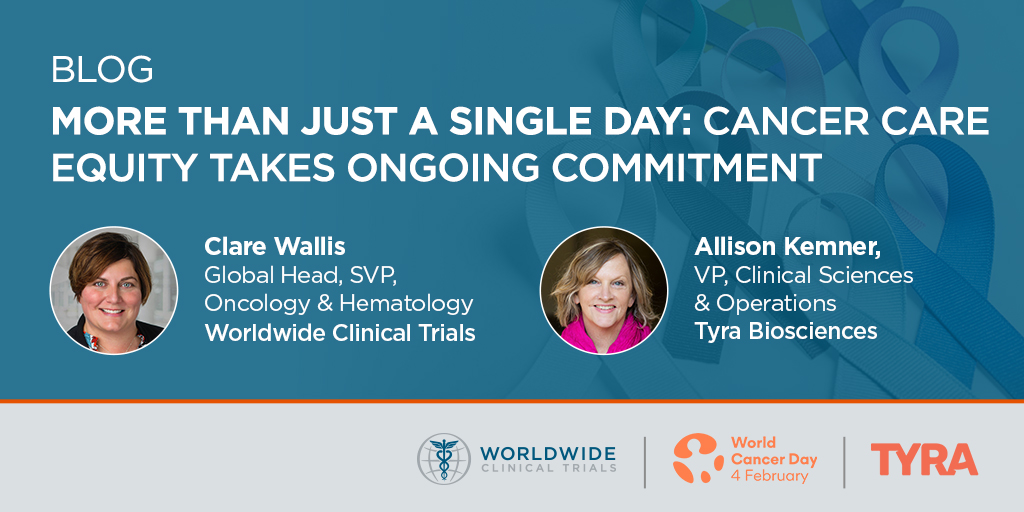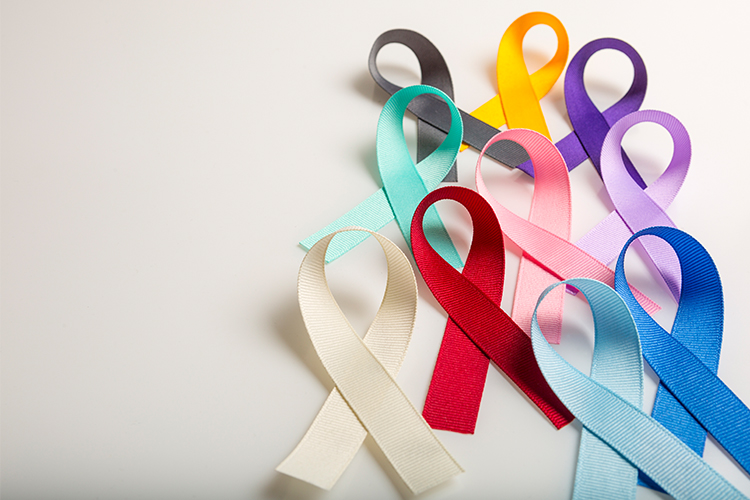By Clare Wallis, SVP Oncology, Worldwide Clinical Trials & Allison Kemner, VP, Clinical Sciences and Operations, Tyra Biosciences
Close the care gap: Everyone deserves access to cancer care. That’s the theme for World Cancer Day (this year on 4 February), and we find it fitting the concept isn’t something with a fixed endpoint. Closing the care gap can’t be accomplished in a single day. Nor can it be achieved by passively thinking and talking about it. Instead, the theme is part of a multi-year campaign that summons us to an active and ongoing commitment to cancer care equity.

Through both professional and personal experiences fighting against cancer, we’re acutely aware that this disease doesn’t mind where it strikes. It shows little regard for ethnicity, age, gender, sexual orientation, nationality, religion, socioeconomic status, and other factors. Yet research into potentially lifesaving treatments seldom mirrors humanity’s rich diversity.
For example, a January article on equity, diversity, and inclusion in cancer care by the American Society of Clinical Oncology (ASCO) notes Black Americans have the highest death rate and shortest survival rate of racial groups in the U.S. Despite this observation, they are among the populations who remain disproportionately underrepresented in oncology clinical trials. Black and Hispanic populations represent 15% and 13%, respectively, of all cancer patients, but only 4%-6% of trial participants are Black and 3%-6% are Hispanic. ASCO also observes that low- and middle-income countries where large disparities in cancer care exist now experience the most cancer deaths.
Both sponsor and CRO, collectively, have an obligation and the opportunity to remediate health inequity by taking active steps to close the gap in care.
One way we’ve found to make incremental progress is by choosing development partners who share, own, and demonstrate a commitment to this initiative. Tyra Biosciences has made a purposeful commitment to ensure patients’ voices are represented across the development spectrum, even as trial initiation begins. Tangibly, this means bringing patients, caregivers, and advocates into the development pipeline at early stages to ensure studies in development are aligned with patients’ goals and needs. These steps deepen our understanding of the various barriers that prevent inclusiveness and enable the adoption of tailored activities to help overcome them. More so, aligning perspectives early in development widens the net for potential patients who may otherwise be unable to access clinical trials.
Dedicated to diversity
Worldwide Clinical Trials’ corporate mission is to work with passion and purpose every day to improve lives. That means prioritizing diversity, equity, inclusion, and belonging as core values every day.
Worldwide aims to ensure it brings that enthusiasm to all its development partners, working together to explore and evaluate new solutions for expanding access for the patients and volunteers recruited for clinical trial participation. While it is often easier to reach out to tried-and-true testing sites, science demands diversity. Study cohorts must be representative of the patient populations the therapies are intended to serve—which often means expanding access to clinical trials for underserved or under-represented patient demographics.
Fortunately, learning and using data and knowledge to adapt is an integral part of research. Studies show that privilege and bias are real, and we know from experience that successful patient recruitment and retention requires the insight and perspective of people from traditionally underserved populations.
In late 2020, the U.S. Food and Drug Administration (FDA) released a guidance document titled, “Enhancing the diversity of clinical trial populations—eligibility criteria, enrollment practices, and trial designs guidance for industry.” It explains how trial participants should represent the population who will use the product once it’s approved, and it goes on to suggest ways to accomplish more diversity within study populations even in the early stages—such as by broadening eligibility criteria and adopting more inclusive enrollment practices.
Keep up the fight
Undertaking clinical research with a diversity lens may not always be the shortest or easiest path to take, but it is unquestionably the right one. It requires purposeful change to our normal ways of working. This year, World Cancer Day helps shine a spotlight on the need to close gaps in cancer care. But as we in the oncology research community know, World Cancer Day must extend far beyond 4 February. Every day is World Cancer Day. Creating more equitable access to high-quality cancer care is our ongoing fight.




